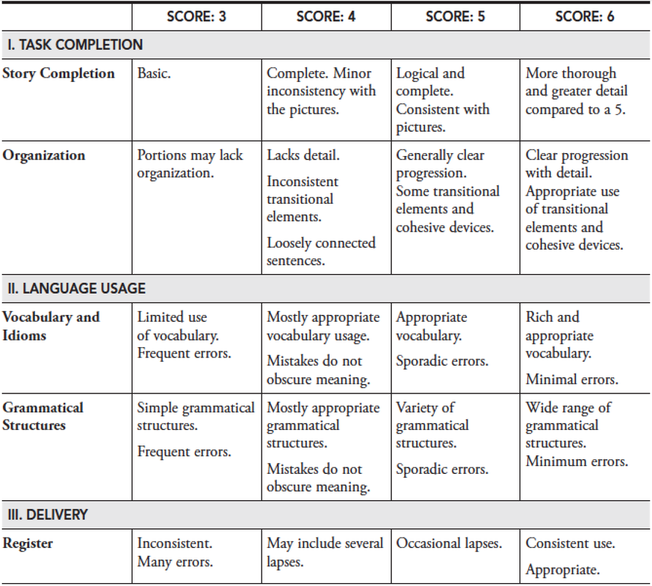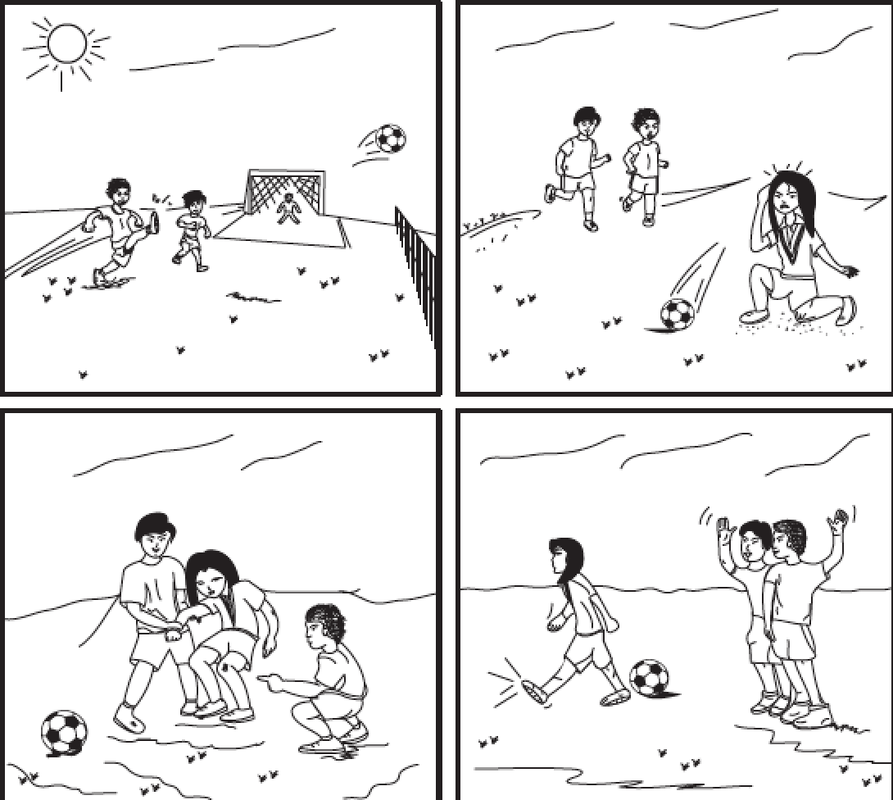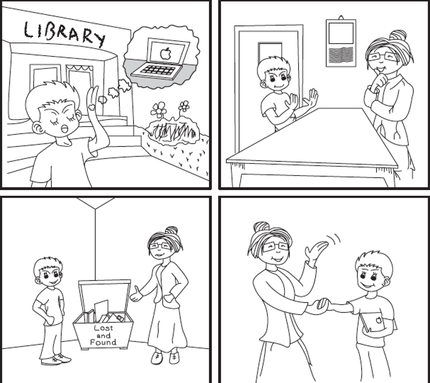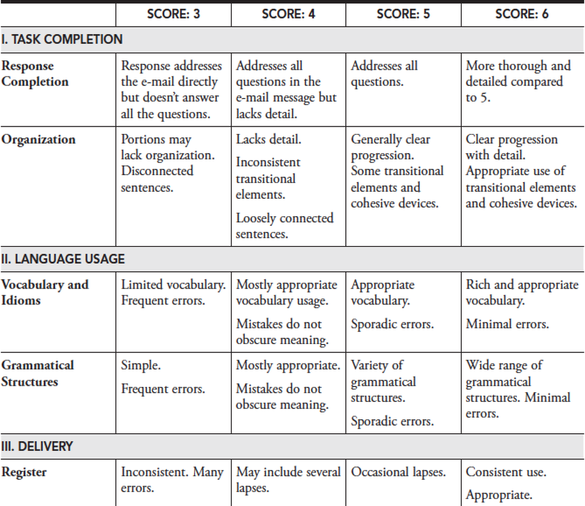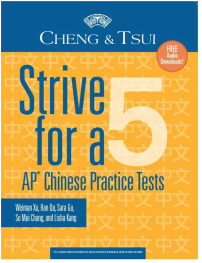WRITING: PRACTICE QUESTIONS
Developing Advanced-Level Writing Skills
ADDING DESCRIPTIVE ELEMENTS to simple sentences fulfills the requirement of rich language usage in the AP exam. How do you elaborate a simple sentence to achieve an advanced level? You just need to add all or some of the elements: time, location, adjectives, adverbs, weather, feelings/facial expressions, and so on. Learn to do this first, and then apply Functional Grammar.
Examples:
1. S + V + O [basic sentence]
2. Add time, location, adjectives, adverbs, weather, feelings/facial expressions.
3. Apply functional grammar.
1. S + V + O [basic sentence]
- 我见到了小明。 (I saw Xiao Ming.)
2. Add time, location, adjectives, adverbs, weather, feelings/facial expressions.
- 今天下午天气很好,我在图书馆突然见到了最好的朋友小明,我很高兴。
- (The weather was nice this afternoon. I met my best friend Xiao Ming by accident at the library. I was very happy.)
3. Apply functional grammar.
- 因为今天下午天气很好,所以我去了图书馆。我突然见到了我最好的朋友小明,他也看到了我。不但我很高兴,小明也很高兴:“如果我没来图书馆,就不会见到你了。”
- (Because the weather was nice this afternoon, I went to the library. Suddenly I saw my best friend Xiao Ming, and he saw me as well. Not only was I happy, but so was Xiao Ming: “If I hadn't come to the library, I would not have seen you here!”)
PRACTICE TIME: Please elaborate on the following basic SVO structures according to the example above. Create a complex, multi-clause sentence:
- 我喜欢春节。
- 我去年去了中国。
- 我们一家人爬了华山。
- 包饺子很难。
- 学中文很有趣。
Part I: Story Narration
How do you get a high score on the Story Narration? To answer this question, you’ll need to have an idea of what kinds of answers can reach a score of 5 and above. Let’s start with an analysis of the scoring guidelines.
Like the scoring for the conversation and culture presentation, each student’s response is graded on a scale of 1 to 6. Conversations at level 6 are considered “excellent,” while those graded at level 5 are “very good.” Level 4 scores are “good,” and level 3 is “adequate.” Your performance on the story narration portion of the exam—like the scoring on all the free-response questions—is evaluated on the basis of three criteria using this rubric:
First, you need to write a complete story (task completion). Second, you need to add elaborated description (language usage). At the end, you should check and minimize errors (delivery). Task completion is the most important criteria and also the easiest one on which to get a high score. A common mistake many students make is to write too much at the beginning and then they don’t have time for the fourth picture. However great your answers are, if you miss the fourth picture, the highest score you can get is only a 3. To score higher, you definitely need a complete story.
Like the scoring for the conversation and culture presentation, each student’s response is graded on a scale of 1 to 6. Conversations at level 6 are considered “excellent,” while those graded at level 5 are “very good.” Level 4 scores are “good,” and level 3 is “adequate.” Your performance on the story narration portion of the exam—like the scoring on all the free-response questions—is evaluated on the basis of three criteria using this rubric:
First, you need to write a complete story (task completion). Second, you need to add elaborated description (language usage). At the end, you should check and minimize errors (delivery). Task completion is the most important criteria and also the easiest one on which to get a high score. A common mistake many students make is to write too much at the beginning and then they don’t have time for the fourth picture. However great your answers are, if you miss the fourth picture, the highest score you can get is only a 3. To score higher, you definitely need a complete story.
Practice Questions:
Prompt: The four following pictures present a story. Imagine you are writing the story to a friend. Narrate a complete story as suggested by the pictures. Give your story a beginning, a middle, and an ending. You will have 15 minutes to complete this task.
|
PROMPT 1:
|
PROMPT 2:
|
General Strategies:
Step 1: Write an Outline (Task Completion)
1. Quickly look at the pictures and create a brief story in your mind. (30 seconds) Two boys were playing soccer in the field. One boy kicked the ball, and the ball bumped the head of a girl pedestrian. The boys ran to the girl to check and found out that she was OK.
2. After you’ve spent a few seconds to create a story in your mind, begin typing. List each action in the pictures; you should cover all the actions shown. (2. minutes)
3. Working from the actions you wrote down, you should write approximately four sentences--one sentence per picture--to narrate the story. (4 minutes)
Example (Prompt 1):
1. Quickly look at the pictures and create a brief story in your mind. (30 seconds) Two boys were playing soccer in the field. One boy kicked the ball, and the ball bumped the head of a girl pedestrian. The boys ran to the girl to check and found out that she was OK.
2. After you’ve spent a few seconds to create a story in your mind, begin typing. List each action in the pictures; you should cover all the actions shown. (2. minutes)
3. Working from the actions you wrote down, you should write approximately four sentences--one sentence per picture--to narrate the story. (4 minutes)
Example (Prompt 1):
- 两个男孩踢足球,一个踢球,球打了女孩的头,女孩坐地上,一男扶起女孩,一男看她膝盖,两男挥手,女孩笑。(Who, where, what, when?)
- 小王和小张在球场踢足球。(What happened?)
- 球打到了一个女孩子的头,她倒在了地上。小王和小张跑过来。(Who, where, what, when?)
- 小王扶起女孩,小张看女孩的膝盖。
- 女孩子站起来,向前走了两步,小王和小张跟她说再见。
Step 2: Make the Story Complete and Vivid (Language Usage)
1. There are a lot of strategies to make your narration more vivid and interesting. You can add adverbs and adjectives; describe the environment, facial expressions, or body movements; and/or add details about the action. By making your narration more vivid you’ll improve you score on language usage.
2. First, ask yourself what you missed that can be added. When thinking about what should be added, consider the following:
Example (Prompt 1):
1. There are a lot of strategies to make your narration more vivid and interesting. You can add adverbs and adjectives; describe the environment, facial expressions, or body movements; and/or add details about the action. By making your narration more vivid you’ll improve you score on language usage.
2. First, ask yourself what you missed that can be added. When thinking about what should be added, consider the following:
- the actions of different people
- environmental changes (location, time, weather, etc.)
- facial expressions
Example (Prompt 1):
- 小王和小张在球场踢足球。>>> 小王和小张在球场踢足球。小王把球踢了出去。
- 球打到了一个女孩子的头,她倒在了地上。小王和小张跑过来。 >>> 球打到了一个女孩子的头,她倒在了地上。小王和小张飞快地跑过来。
- 小王扶起女孩,小张看女孩的膝盖。>>> 小王把女孩轻轻地扶起来,小张紧紧地盯着女孩的膝盖,有些着急。
- 女孩站起来向前走,小王和小张向她挥手。>>> 女孩站起来,向前走了两步,小王和小张笑着向她挥手再见。
Step 3: Edit Grammar and Add Transition Words (Delivery)
1. If your response consists of only a list of sentences about the four pictures, you will end up with a score of 2. It needs to be a coherent story. Therefore, you need some “CG” time; that is, pay attention to conjunctions and grammar.
2. If time permits, add some idioms or richer and more accurate vocabulary and expressions. This will allow you to demonstrate your higher proficiency in both the categories of “Language Usage” and “Delivery.” Using these three steps you’ll be able to enhance your story to a level 6.
Example (Question 1):
小王和小张在球场踢足球。小王飞起一脚把球踢了出去。糟糕!球打中了一个女孩的头,把她撞到了地上。小王和小张吓得飞快地跑过来。小王把女孩轻轻地扶起来,小张着急地盯着女孩的膝盖,问道:“你怎么样?”女孩于是站起来,试着向前走了两步,回答说:“不要紧,没受伤。下次你们小心点啊!”小王和小张不好意思地笑了,向她挥手说再见。
1. If your response consists of only a list of sentences about the four pictures, you will end up with a score of 2. It needs to be a coherent story. Therefore, you need some “CG” time; that is, pay attention to conjunctions and grammar.
2. If time permits, add some idioms or richer and more accurate vocabulary and expressions. This will allow you to demonstrate your higher proficiency in both the categories of “Language Usage” and “Delivery.” Using these three steps you’ll be able to enhance your story to a level 6.
Example (Question 1):
小王和小张在球场踢足球。小王飞起一脚把球踢了出去。糟糕!球打中了一个女孩的头,把她撞到了地上。小王和小张吓得飞快地跑过来。小王把女孩轻轻地扶起来,小张着急地盯着女孩的膝盖,问道:“你怎么样?”女孩于是站起来,试着向前走了两步,回答说:“不要紧,没受伤。下次你们小心点啊!”小王和小张不好意思地笑了,向她挥手说再见。
Part II: Email Response
In this part of the exam—the second task of Section II, Part A (Writing)—you will write a response to an e-mail message in 15 minutes. There will be a clock on your computer screen in the real exam telling you how much time is left. You will read an e-mail message and then write a response that answers all the questions in the e-mail. There is always more than one question in the email (usually two).
The College Board provides scoring guidelines for the email response. Like the scoring for the conversation and the culture presentation, each student’s response is graded on a scale of 1 to 6. Conversations at level 6 are considered “excellent,” while those graded at level 5 are “very good.” Level 4 scores are “good,” and level 3 is “adequate.”
Your performance on the email response portion of the exam—like the scoring on all the free-response questions—is evaluated on the basis of three criteria using this rubric:
The College Board provides scoring guidelines for the email response. Like the scoring for the conversation and the culture presentation, each student’s response is graded on a scale of 1 to 6. Conversations at level 6 are considered “excellent,” while those graded at level 5 are “very good.” Level 4 scores are “good,” and level 3 is “adequate.”
Your performance on the email response portion of the exam—like the scoring on all the free-response questions—is evaluated on the basis of three criteria using this rubric:
Practice Questions:
Prompt: Read this e-mail from a friend and then type a response.
|
PROMPT 1:
发件人:周立 邮件主题:中国旅游 小新, 你好!我暑假会去中国玩一个星期。我希望可以去香港看一看我的朋友,也可以到北京去爬一下长城。由于时间有限,关于旅游的第三个城市你觉得是西安好还是上海好呢?还有,你对于在中国旅游的安全问题有什么建议吗? 希望早点收到你的回信。 |
PROMPT 2:
发件人:方晓 邮件主题:社会实践 陈亮军, 你好!我打算暑假参加社会实践活动,现在有两个不同的机会,一个是在市游泳馆做救生员,另一个是在公共图书馆做义工。你觉得我应该参加哪一个比较好?另外我也很好奇,你从前经常做义工,你认为怎样才能在社会实践活动中更好地锻炼自己的能力呢?谢谢! |
General Strategies:
Step 1: What to Write?
1. You’ll find that this task is designed to test your writing skills in two aspects: comparison and persuasion. Therefore, your focus should be on practicing the skills of two kinds of questions:
1. You’ll find that this task is designed to test your writing skills in two aspects: comparison and persuasion. Therefore, your focus should be on practicing the skills of two kinds of questions:
- A or B, which one is better and why?
- What are your suggestions on a broader topic related to A and B?
- Which city is better, Xi’an or Shanghai? 西安好还是上海好?
- The word 还是 helps you to identify this question.
- What are your suggestions on travel safety in China? 有什么建议吗?The words helping you to identify this question in the e-mail message are normally:
- 觉得,认为,建议,考虑 etc.
Step 2: How to Respond?
1. You may be familiar with the style of a five paragraph essay; however, due to the time limit this is probably not a good structure for this task. All you need here are four paragraphs.
2. A good answer to the e-mail response is always a very structured one that compares and persuades. That means you actually can create the structure as completely as possible before the exam. Remember, you have only 15 minutes, including reading the e-mail, in which to respond.
3. Creating and memorizing in advance a well-prepared structure with concise logic and good language usage will win you a lot of time in the real exam. Furthermore, collecting frequently used expressions can make your writing more beautiful and the delivery smoother. For most prompts (the e-mail message you need to respond to), you may try the following.
Paragraph #1: Greeting [Name], ...
Example Outline (Prompt 1):
周立,
你好!好久没和你联系了,收到你的电子邮件很开心。[paragraph 1]
你问我关于……的问题,我认为你应该……。首先,A……。如果你选A的话,你就能够……。其次,从我个人的 经验来看, A比B……。要是你选A,你还可以……. 。 [paragraph 2: response to question #1]
你提到……,我觉得/的建议是……。[paragraph 3; response to question #2]
祝你…… [paragraph 4]
1. You may be familiar with the style of a five paragraph essay; however, due to the time limit this is probably not a good structure for this task. All you need here are four paragraphs.
2. A good answer to the e-mail response is always a very structured one that compares and persuades. That means you actually can create the structure as completely as possible before the exam. Remember, you have only 15 minutes, including reading the e-mail, in which to respond.
3. Creating and memorizing in advance a well-prepared structure with concise logic and good language usage will win you a lot of time in the real exam. Furthermore, collecting frequently used expressions can make your writing more beautiful and the delivery smoother. For most prompts (the e-mail message you need to respond to), you may try the following.
Paragraph #1: Greeting [Name], ...
- Long time no see, how is everything?
- How is your life recently?
- Regarding your question of “which one is better, A or B” (repeat the question), I would say that A is better. First, if it is A, you will … (common sense); second, in my experience,
- A is … than B. Therefore, you can ….
- Regarding …, my personal suggestion would be ….
- I hope that you ….
- Sincerely yours, ... [your name]
Example Outline (Prompt 1):
周立,
你好!好久没和你联系了,收到你的电子邮件很开心。[paragraph 1]
你问我关于……的问题,我认为你应该……。首先,A……。如果你选A的话,你就能够……。其次,从我个人的 经验来看, A比B……。要是你选A,你还可以……. 。 [paragraph 2: response to question #1]
你提到……,我觉得/的建议是……。[paragraph 3; response to question #2]
祝你…… [paragraph 4]
Step 3: What to Fill In to Complete Your Response
1. The real creative work starts at step #3. You may feel it difficult to find reasons to support your point in just several minutes.
2. In most cases, the best way to think about your responses for both questions consists of looking at two types of reasons: “personal reasons” and “global reasons,” or to be more exact, your subjective personal experiences and the objective reality of the world. Thinking in this way will help you to focus and more quickly come up with some reasons you can write about.
3. For this e-mail message, you can create a final answer for the e-mail response by filling in these words (underlined).
Example Response (Prompt 1):
周立,
你好!好久没和你联系了,收到你的电子邮件很开心。欢迎来中国玩!
你问我关于去西安好还是去上海好的问题,我认为你应该去西安。首先,西安有全世界著名的名胜古迹,那里的兵马俑是中国第一个皇帝制作的。如果你选西安的话,你就能够看到真正代表中国历史和文化的东西[global]。其次,从我个人经验来看[personal],上海比西安更国际化,给人的感觉和香港比较相似,既然你会去香港,这次就可以不去上海。还有啊,要是你去西安,你还可以像我一样买到很便宜的纪念品,带回美国做为礼物相当合适。
你提到在中国旅游的安全问题,除了旅游的基本安全常识[global]以外,我建议[personal]你要特别小心中国的小偷骗子。你一定要把自己的东西保管好,不要轻信陌生人的话。
其实在中国旅游还是很安全的,祝你玩得开心!
小新
1. The real creative work starts at step #3. You may feel it difficult to find reasons to support your point in just several minutes.
2. In most cases, the best way to think about your responses for both questions consists of looking at two types of reasons: “personal reasons” and “global reasons,” or to be more exact, your subjective personal experiences and the objective reality of the world. Thinking in this way will help you to focus and more quickly come up with some reasons you can write about.
3. For this e-mail message, you can create a final answer for the e-mail response by filling in these words (underlined).
Example Response (Prompt 1):
周立,
你好!好久没和你联系了,收到你的电子邮件很开心。欢迎来中国玩!
你问我关于去西安好还是去上海好的问题,我认为你应该去西安。首先,西安有全世界著名的名胜古迹,那里的兵马俑是中国第一个皇帝制作的。如果你选西安的话,你就能够看到真正代表中国历史和文化的东西[global]。其次,从我个人经验来看[personal],上海比西安更国际化,给人的感觉和香港比较相似,既然你会去香港,这次就可以不去上海。还有啊,要是你去西安,你还可以像我一样买到很便宜的纪念品,带回美国做为礼物相当合适。
你提到在中国旅游的安全问题,除了旅游的基本安全常识[global]以外,我建议[personal]你要特别小心中国的小偷骗子。你一定要把自己的东西保管好,不要轻信陌生人的话。
其实在中国旅游还是很安全的,祝你玩得开心!
小新
Email Response Sentence Templates:
The task of e-mail response is focused on comparison and persuasion. Following, you’ll find sentence templates frequently used to accomplish those tasks. Learn them and select a couple of sets to memorize and use to build your own structure for the e-mail response you need to write for the AP exam. The more details you prepare in advance, the better you can apply them on the real exam. Then, practice typing your sentence templates on the computer until you can finish the structure of the e-mail response in 4 minutes.
1. Greet the Friend
2. Respond to Email Question #1
Repeat the Question:
Give Reasons (Global and Personal):
3. Provide a Better Solution
3. Respond to Email Question #2
4. End the Email
- 收到你的邮件我很开心。你有……的机会真是太棒了!
- 好久没和你联系了,我一直挺想你的。
- 原来你……我还真是羡慕你有……的生活。
2. Respond to Email Question #1
Repeat the Question:
- 得知你正在为……发愁,我觉得这个问题不难解决。
- 你在信中问我……,关于这个问题,我的建议是……。
- 你想了解最好的....是什么,每个人的看法都不一样。
Give Reasons (Global and Personal):
- 我认为你完全可以选A。
- 首先,A是……,可以帮助你……,还可以……。
- 另一方面,A能……;
- 当然,B也能……,但是总的来说,A比B更能…… (global)。
- 我自己也有过同样的经历 (personal),后来选了A,结果……(great result)。
- A和B各有利弊。A的话,……(strength),不过,A……(weakness)。如果选B,B可以……但无法……(global)
- 当然,说起来容易做起来难,我也遇到过同样的问题
- 当时我……(choose A),后来……(solved A’s weakness),最后……(good result),我觉得你也可以试试 (personal)。
- 有的人喜欢……,有的人喜欢……,但无论如何,最好的……应当包括……(the best way)。
- 如果有……,就可以……。要是没有…..,……就无法(reach the best result); 因为……(global)。并且,我从前…..,发现……,所以我个人认为,还是……最能解决问题(personal)。
3. Provide a Better Solution
- 有冲突其实很正常,两全其美的方法是A时间做A,B时间做B。
- 如果你实在不能取舍,你可以先选A……(what you like or what you are good at),然后再……。
3. Respond to Email Question #2
- 说起这个 question 2,我的建议是……。你可以……,还可以……,最重要的是……。
- 你问我 question 2,我认为你首先应该注意……,还有你也不能忽视……,至于……,同样可以帮助你……。
- 一个好的 question 2,第一可以考虑……。其次要注意的是……。另外,也不要忘了……,因为……带来的是……。
4. End the Email
- 希望我的看法对你有所帮助。你最后是怎样决定的,一定要记得来信告诉我。
- 我的看法不一定对,你还可以咨询一下……(朋友、老师、父母等),听听他们的建议。
- 祝一切顺利!(an issue the receiver needs solved)
- 祝心想事成!(sth. difficult the receiver decides to try)
- 祝你玩得开心! (happy activities the receiver wants to do)
Self-Evaluation and Scoring Analysis:
1. Did your answer cover both questions?
2. Was your response complete and understandable to the reader?
3. Was your response well structured, with rich language usage and minor errors?
- Yes. Your score may be a 3 even if you didn’t completely address all the questions of the e-mail message.
2. Was your response complete and understandable to the reader?
- Yes. Your score may be 4 and above, even if your answer lacks detail or elaboration, has loosely connected sentences, or includes some errors that are not serious enough to not obscure the meaning. That means you have to write something about why you should choose the social work and how to be a good social worker.
3. Was your response well structured, with rich language usage and minor errors?
- Yes. Your score may be 5 and above. A rich use of vocabulary and grammar is essential and crucial to get to this level. There are a lot of factors to stop you from scoring 6, most of which are sporadic grammatical errors and occasional lapses of register to the situation. Now use the self-evaluation worksheet at the end of this chapter to identify your weakness and adjust your study plan.
Recommended Resources for Practice:
© 2019 Hugo Xiong. [email protected]
